Is your HVAC cooling system acting up? This guide will cover 10 common problems in your HVAC cooling system and how to fix them. From poor airflow to frozen coils, find out what might be wrong and what you can do about it.
Key Takeaways
- Poor airflow in HVAC systems can be caused by dirty filters, leaky ducts, and blocked vents; regular maintenance is essential for optimal operation.
- Common issues such as warm air from vents, low refrigerant levels, and clogged drain lines can significantly affect cooling efficiency and should be addressed promptly.
- Regular cleaning and maintenance of condenser coils and other components help improve energy efficiency and lifespan, preventing costly repairs.
Don’t let small HVAC issues turn into big headaches—call the team that Milwaukee trusts most. At Quality Heating, Milwaukee’s quality HVAC cooling repair services, we make it easy to fix the 10 most common cooling problems with fast, reliable service that lives up to our name.
Poor Airflow
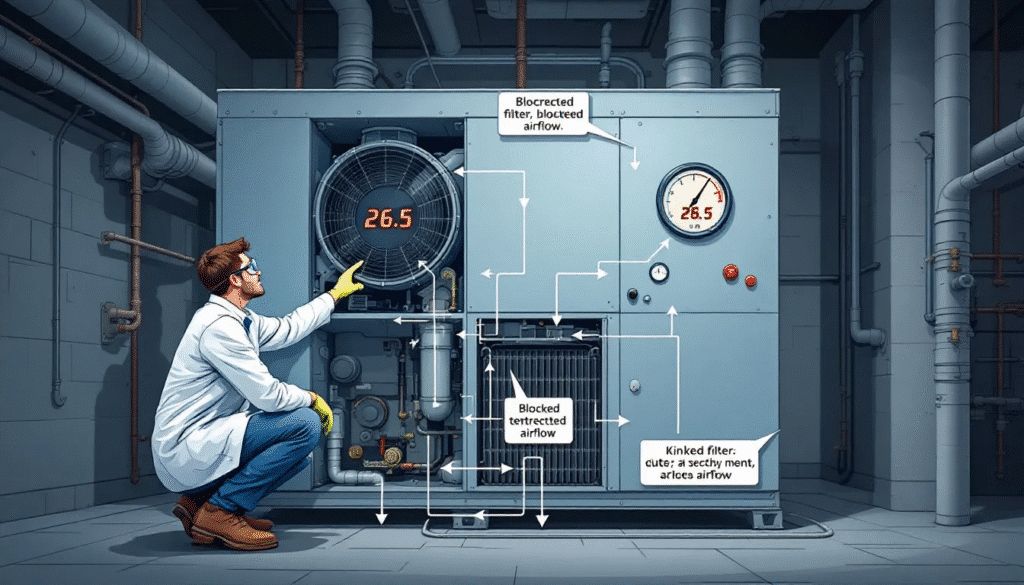
One of the most common HVAC problems with HVAC systems is poor airflow. Symptoms include uneven temperatures throughout your home and a general lack of cooling efficiency. This problem can stem from several sources, including dirty filters, leaky ducts, blocked vents, and an air conditioning system.
Dirty filters are a primary culprit. They restrict airflow, forcing the system to work harder and increasing the risk of damage due to a clogged filter and clogged filters. Replacing or cleaning the air filter every 60-90 days helps maintain good airflow and improve air quality. Clogged air filters can exacerbate these issues.
Leaky ducts also reduce efficiency by letting cool air escape before it reaches your living spaces. Sealing and insulating ducts can mitigate this issue.
Blocked vents disrupt airflow and can lead to restricted airflow. Furniture, rugs, or curtains obstructing vents can create uneven temperatures, and poor placement of blocked ducts can also contribute to this issue. Keeping vents clear and open helps the system run more efficiently.
Regular maintenance and professional inspections can identify and resolve these problems, ensuring optimal HVAC operation.
Warm Air from Vents
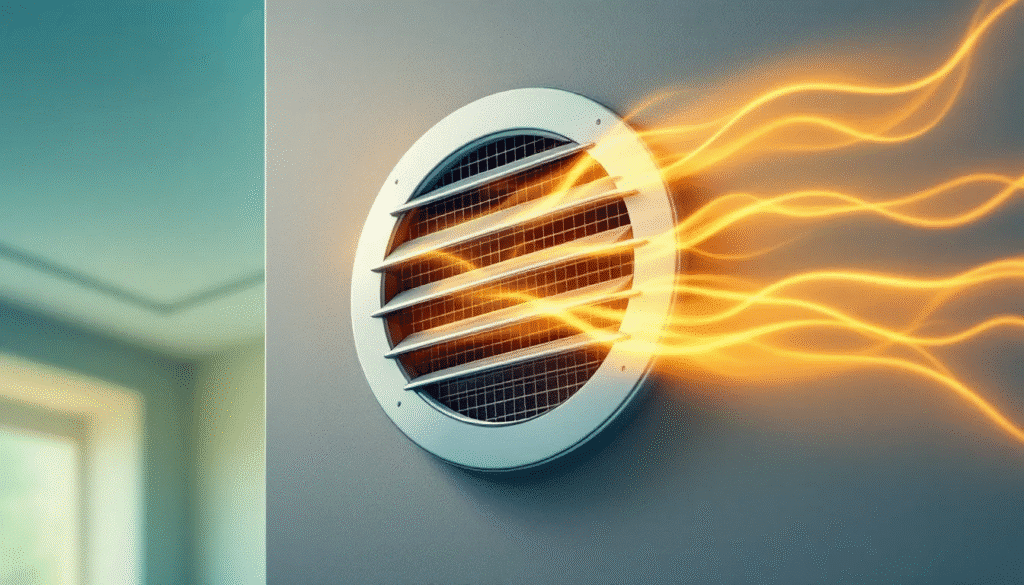
Expecting cool air but feeling warm instead can be frustrating. Incorrect thermostat settings or a malfunctioning thermostat might be the cause. Make sure your thermostat is set correctly and functioning well.
Low refrigerant levels can also hinder cooling. Refrigerant leaks, often due to corrosion or damage, need prompt attention from a professional to prevent further issues. Compressor issues can also result in warm air from vents, as it fails to circulate refrigerant properly.
Dirty air filters and damaged components can worsen the problem. Regular maintenance, including filter changes and professional inspections of the air conditioner, is crucial for ensuring efficient cooling.
Clogged Drain Lines
Clogged drain lines disrupt HVAC function. The condensate drain line removes moisture from the air, but when clogged, it can cause water leaks, potentially leading to water damage and mold growth. A drain pan can help collect any overflow.
Excessive condensation on evaporator coils due to clogged drain lines can further hinder efficiency. Water buildup can overflow, causing indoor damage and promoting mold and algae growth. Regularly checking and cleaning the condensate drain prevents these issues.
If you suspect a clog, call an HVAC technician for assistance. Regular maintenance, including changing air filters every 60-90 days, can also prevent frozen evaporator coils and related drain issues.
Low Refrigerant Levels
Low refrigerant levels can severely impact your HVAC system’s efficiency. Inadequate cooling or ice buildup on evaporator coils may indicate low refrigerant levels. This causes the system to work harder, leading to longer operation times and higher energy bills.
Leaks can occur due to corrosion, damage, or improper installation. Promptly identifying and repairing these leaks is crucial to prevent system failure. Leak detection methods include visual inspections for oil residue, soapy water tests, or electronic detectors.
If you suspect a refrigerant leak, contact a professional for evaluation and repair. Regular maintenance and prompt repairs keep your cooling system efficient and effective.
Dirty Condenser Coils
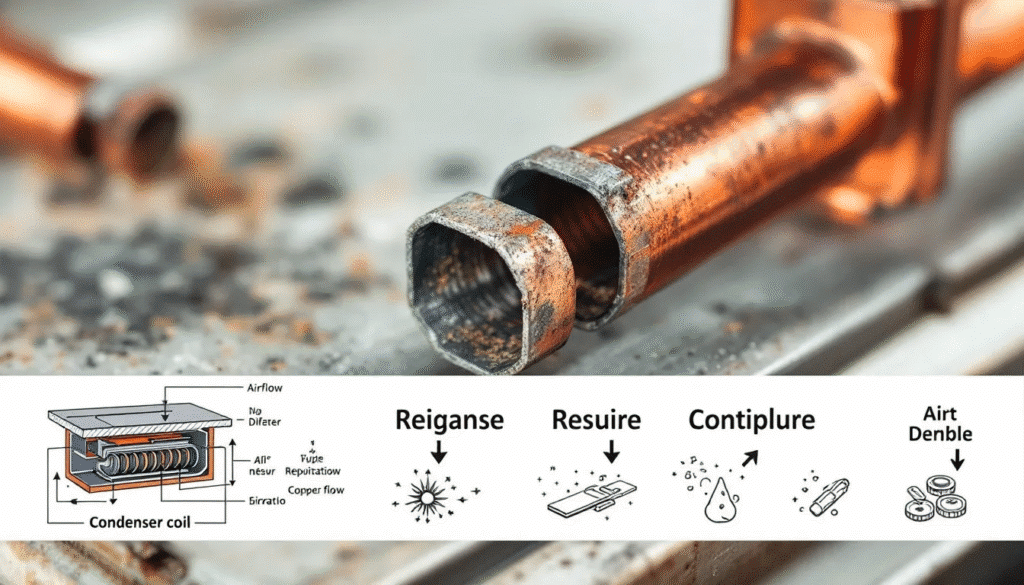
A dirty condenser coil in an HVAC unit, representing one of the common HVAC problems.
Dirty condenser coils can significantly decrease HVAC efficiency. Even a thin layer of dirt can reduce energy efficiency by up to 21%. Dirty coils work harder and longer to cool your home, increasing energy costs and potential equipment failures.
Regular cleaning of condenser coils prevents dirt and debris buildup, common due to environmental exposure. Air intake filters can minimize debris accumulation, reducing cleaning frequency.
Failing to clean condenser coils can lead to costly repairs or even the replacement of the entire HVAC unit. Regular professional maintenance keeps your system efficient and extends its lifespan.
Frozen Evaporator Coils
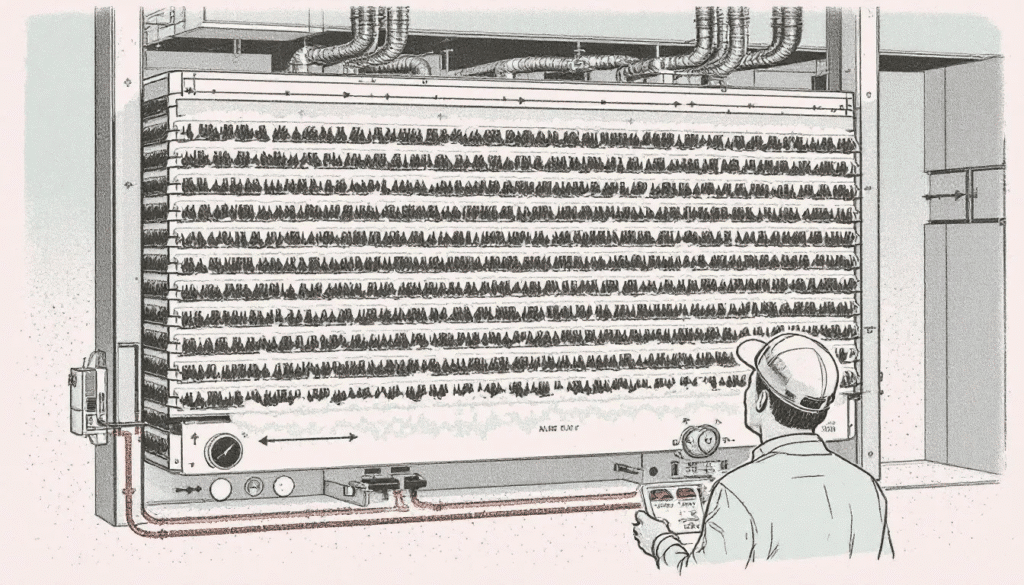
Frozen evaporator coils signal trouble in your HVAC system. They can result from:
- Inadequate airflow
- Low refrigerant levels, preventing proper heat absorption
- Extremely low outdoor temperatures causing the frozen evaporator coil to freeze due to insufficient heat in the air.
Frozen coils can cause the following issues for your HVAC unit:
- Force the unit to work harder to maintain temperatures
- Cause the unit to stop working altogether
- Lead to short cycling, where the system frequently turns on and off, reducing efficiency
To resolve frozen coils, turn off the AC and allow them to thaw, which could take up to 24 hours. Addressing the underlying cause, such as replacing a dirty filter or checking refrigerant levels, is essential to prevent recurrence.
Faulty Air Handler
A faulty air handler can cause significant HVAC problems. Common signs include loud banging or screeching sounds, burning smells, and poor air quality despite changing filters. These issues can arise from dirty filters, malfunctioning motors, or faulty wiring.
A blower motor failure can result in a complete loss of airflow or cooling, potentially damaging the compressor. Homeowners should not attempt to fix a faulty air handler’s motor themselves; it requires a professional’s skills and tools. If the air handler does not turn on, it may be due to blown fuses, a tripped circuit breaker, or incorrect thermostat settings, necessitating professional assessment.
Regular maintenance and inspections by a qualified HVAC technician or a trained technician, including a professional HVAC technician, can help detect and resolve air handler issues before they cause significant damage.
Short Cycling
Short cycling occurs when your air conditioning unit frequently turns on and off, reducing efficiency and causing additional wear. This issue can be caused by an improperly sized unit, especially if it is oversized. A miscalibrated thermostat can also falsely signal that the desired temperature has been reached, causing the system to turn off prematurely.
Leaky air ducts can contribute to short cycling by making it difficult for the system to maintain the temperature. Addressing short cycling issues promptly can prevent significant system damage and ensure efficient operation.
Regular maintenance, including checking for leaks and ensuring the thermostat is calibrated correctly, can prevent short cycling and extend your HVAC system’s lifespan.
Unit Doesn’t Turn On
When your HVAC unit doesn’t turn on, it can be concerning. A tripped circuit breaker is a common reason for this issue. If the AC unit is unplugged, it will also not turn on, which is particularly common with window circuit breakers.
Thermostat malfunctions can prevent the AC unit from starting. Possible thermostat issues and solutions include:
- Resetting the thermostat or unit, which may temporarily resolve the issue
- Seeking professional help, which is often necessary
- Icing on system components, which can prevent proper functioning
If problems persist after checking all the loose components, seek professional assistance. Regular maintenance and timely repairs ensure effective operation, keeping everything functioning correctly and operating properly. Poor maintenance can lead to further issues. If needed, schedule a service call.
High Energy Bills
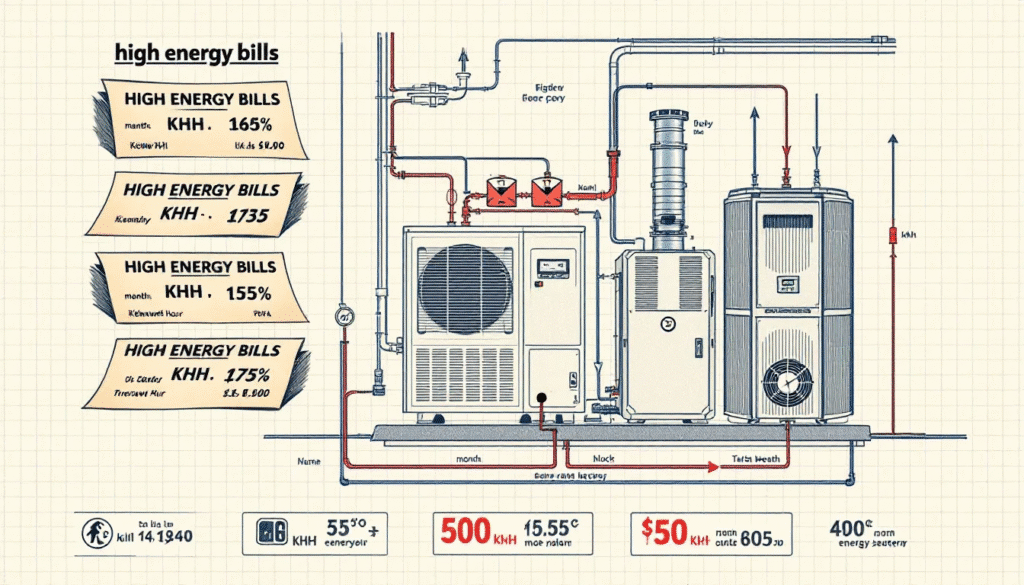
High energy bills can indicate inefficiencies in your HVAC system. Common problems like dirty filters and low refrigerant levels can increase energy consumption and costs. Low refrigerant levels make the system work harder, resulting in longer cooling times and higher energy bills.
Regular maintenance can prevent issues that cause energy usage spikes. Upgrading to modern, energy-efficient HVAC units can also lead to substantial energy savings.
Schedule regular maintenance with an HVAC professional to ensure that systems operate efficiently and reduce energy costs.
Summary
Understanding and addressing common HVAC problems are crucial to maintaining a comfortable and efficient home. From poor airflow to high energy bills, each issue can significantly impact your system’s performance and your comfort.
Regular maintenance and professional inspections are key to preventing these problems. By taking proactive steps, you can ensure your HVAC system runs smoothly, saving you money and keeping your home cool and comfortable.
Frequently Asked Questions
What causes poor airflow in my HVAC system?
Poor airflow in your HVAC system is typically caused by dirty filters, leaky ducts, and blocked vents. Addressing these issues through regular maintenance and professional inspections is essential for optimal performance.
Why is my HVAC system blowing warm air?
Your HVAC system may be blowing warm air due to incorrect thermostat settings, low refrigerant levels, or a malfunctioning compressor. Regularly checking these components can help ensure it functions properly and maintains cool air.
How can I prevent clogged drain lines in my HVAC system?
To prevent clogged drain lines in your HVAC system, regularly check and clean the condensate drain, and change air filters every 60-90 days. This proactive approach will help avoid water leaks and mold growth.
What are the signs of low refrigerant levels in my HVAC system?
Inadequate cooling, ice buildup on the evaporator coils, and increased energy bills are clear signs of low refrigerant levels in your HVAC system. It’s advisable to consult a professional HVAC technician if you notice these symptoms.
How can I reduce high energy bills caused by my HVAC system?
To effectively reduce high energy bills from your HVAC system, prioritize regular maintenance, clean or replace dirty filters, and consider upgrading to energy-efficient models. These steps can significantly lower your energy consumption and costs.
Call Quality Heating, Cooling, Plumbing & Electric Today!
We’ve just walked you through the 10 most common problems your HVAC heating and cooling system might be facing—issues that, if left unchecked, can lead to more serious and costly repairs. The best way to avoid these risks is by scheduling proper annual maintenance with our team of professional HVAC technicians at Quality Heating. Regular service keeps your system running smoothly, improves efficiency, and helps you stay comfortable year-round.



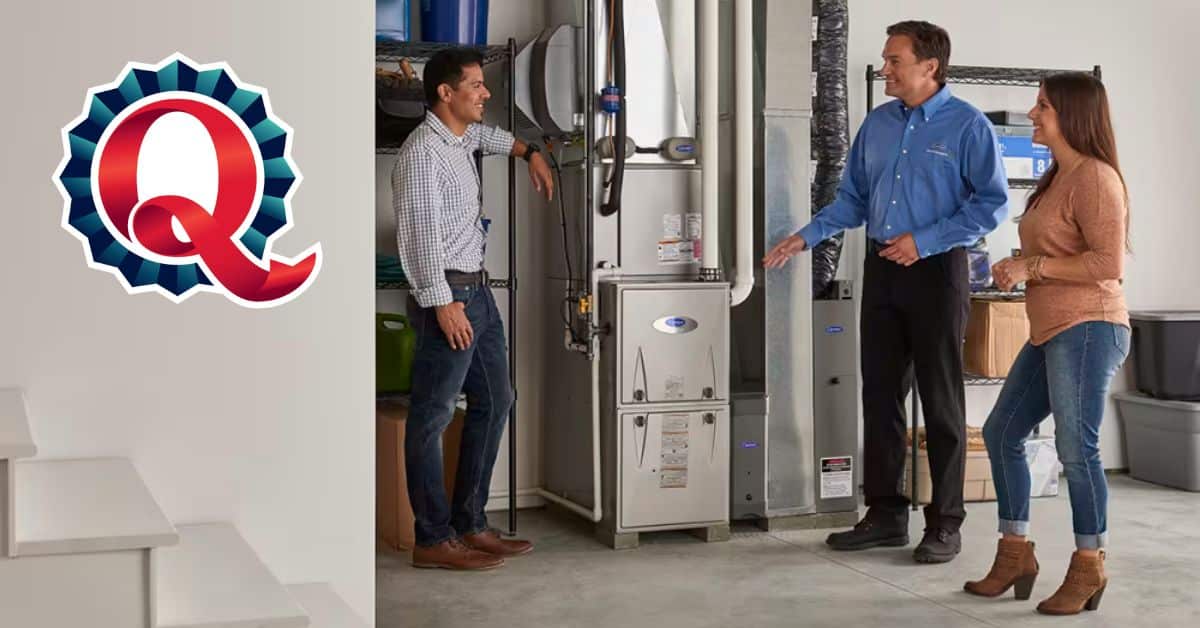
0 Comments